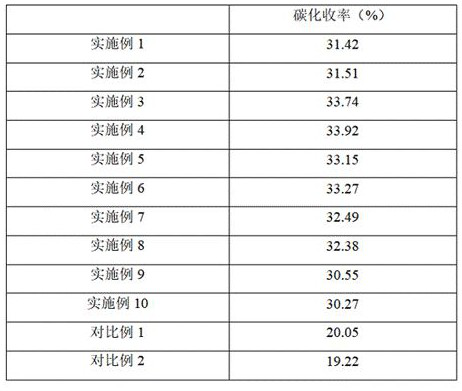A method for improving the carbonization yield of viscose-based carbon felt
A viscose-based, high-temperature carbonization technology, which is applied in the fields of fiber chemical characteristics, rayon chemical post-treatment, textiles and papermaking, etc., can solve problems such as organoboron compounds that have not been reported, shorten pre-oxidation time, and increase carbonization yield , The effect of carbonization yield improvement
- Summary
- Abstract
- Description
- Claims
- Application Information
AI Technical Summary
Problems solved by technology
Method used
Image
Examples
Embodiment 1
[0025] A method for improving the carbonization yield of viscose-based carbon felt, comprising the following steps:
[0026] Step (1) Soak the viscose fiber in the organoboron catalyst for 10 minutes, dehydrate it, and wash it with 40°C pure water for 15 minutes. The preparation method of the organoboron catalyst is as follows: 3 parts of boric acid tris Dissolve isopropyl ester in 30 parts of absolute ethanol, stir evenly, add 1 part of cyanuric chloride, after fully stirring, add 1 part of melamine borate, fully stir and mix evenly, and finally dissolve in 100 parts of absolute ethanol to obtain organoboron Catalysts;
[0027] Step (2) Dry in an oven at 105°C for 120 minutes;
[0028] Step (3) Pre-oxidation: pre-oxidize the dried fibers in a pre-oxidation furnace, pre-oxidize into two temperature zones, the first temperature zone temperature is 200 ° C, the second temperature zone temperature is 220 ° C, pre-oxidation Time: 20 minutes in the first temperature zone, 20 minu...
Embodiment 2
[0031] A method for improving the carbonization yield of viscose-based carbon felt, comprising the following steps:
[0032] Step (1) Soak viscose fiber in organoboron catalyst, use ultrasonic prepreg process, ultrasonic power 80W, dehydrate after ultrasonic 3min at room temperature, wash with 40℃ pure water for 15min, among them, the preparation of organoboron catalyst The method is: in a nitrogen atmosphere protected stirring tank, dissolve 3 parts of triisopropyl borate in 30 parts of absolute ethanol, stir evenly and add 1 part of cyanuric chloride, after fully stirring, add 1 part of boric acid melamine, fully stir and mix homogeneous, then dissolved in 100 parts of absolute ethanol to obtain organoboron catalysts;
[0033] Step (2) Dry in an oven at 105°C for 120 minutes;
[0034] Step (3) Pre-oxidation: pre-oxidize the dried fibers in a pre-oxidation furnace, pre-oxidize into two temperature zones, the first temperature zone temperature is 200 ° C, the second temperatu...
Embodiment 3
[0037] A method for improving the carbonization yield of viscose-based carbon felt, comprising the following steps:
[0038] Step (1) Soak the viscose fiber in an organoboron catalyst for 20 minutes, dehydrate it, and wash it with 50°C pure water for 15 minutes. The preparation method of the organoboron catalyst is as follows: 5 parts of boric acid tris Dissolve isopropyl ester in 30 parts of absolute ethanol, stir evenly, add 2 parts of cyanuric chloride, after fully stirring, add 2 parts of melamine borate, fully stir and mix evenly, and finally dissolve in 100 parts of absolute ethanol to obtain organoboron Catalysts;
[0039] Step (2) drying in an air circulation furnace for 120 minutes;
[0040] Step (3) Pre-oxidation: pre-oxidize the dried fibers in a pre-oxidation furnace, pre-oxidize into two temperature zones, the first temperature zone temperature is 210°C, the second temperature zone temperature is 230°C, pre-oxidation Time: 25 minutes in the first temperature zon...
PUM
 Login to View More
Login to View More Abstract
Description
Claims
Application Information
 Login to View More
Login to View More - R&D Engineer
- R&D Manager
- IP Professional
- Industry Leading Data Capabilities
- Powerful AI technology
- Patent DNA Extraction
Browse by: Latest US Patents, China's latest patents, Technical Efficacy Thesaurus, Application Domain, Technology Topic, Popular Technical Reports.
© 2024 PatSnap. All rights reserved.Legal|Privacy policy|Modern Slavery Act Transparency Statement|Sitemap|About US| Contact US: help@patsnap.com








